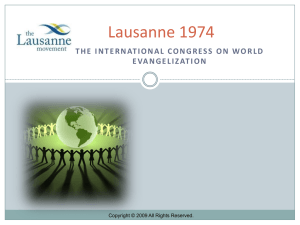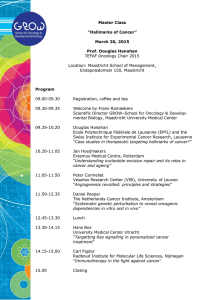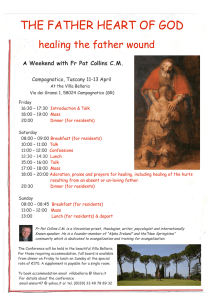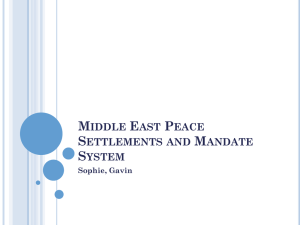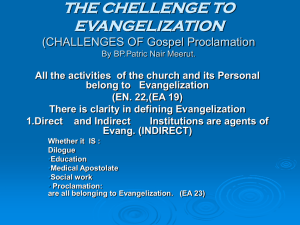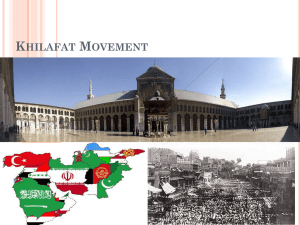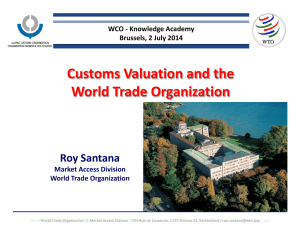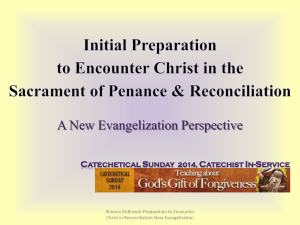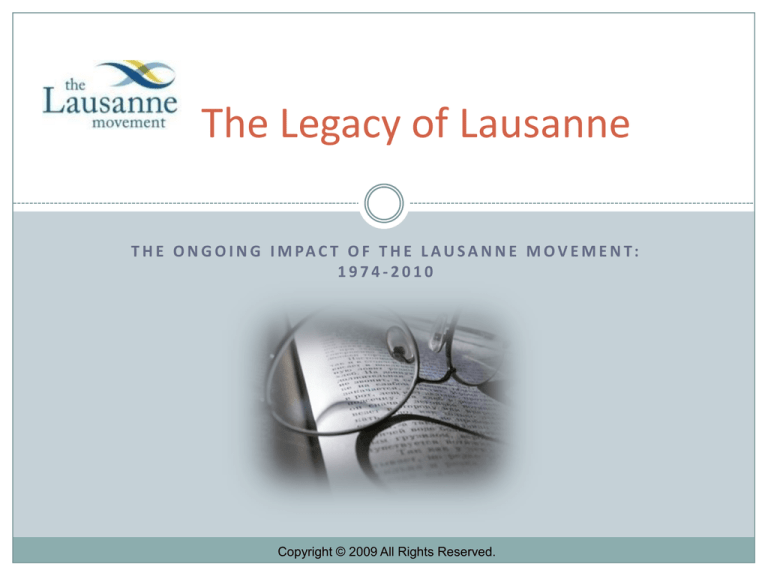
The Legacy of Lausanne
T H E O N G O I N G I M PA C T O F T H E L A U S A N N E M O V E M E N T :
1974-2010
Copyright © 2009 All Rights Reserved.
Lesson Overview
1.
The Lausanne Committee
2.
The Lausanne Movement
3.
The Lausanne Conferences
The evolution of “Lausanne”
The Lausanne Committee
The LCWE was formed in 1976
Initially 48 people, later expanded to 75
Leaders: Leighton Ford; Gottfried Osei-Mensah
Function: to help be an international catalyst for world evangelization
Lausanne Working Groups
The LCWE was initially divided into four working groups to oversee
different strategic areas of the Lausanne Movement. These were:
The Intercession Working Group
The Theology Working Group
The Strategy Working Group
The Communications Working Group
Subsequently, four additional working groups have been introduced:
• The Leadership Development Working Group
• The Resource Mobilization Working Group
• The Technology Working Group
• The Business, Government, Education, Media, and Medical (BGEMM)
Working Group
Intercession Working Group
The Intercession Working Group’s (IWG) purpose is to “Reawaken,
encourage and equip the church to be involved in world
evangelization through Prayer in Evangelism.” God summons us
to pray in the pursuing of His purpose in evangelization of the
world. So we seek to pray in God’s purposes and pray towards
God’s purposes for World Evangelization.
Bishop John Reid was the first chair. Rev. Sarah Plummer is the
current chair.
Strategy Working Group
The Strategy Working Group is commissioned to serve the Body of
Christ in providing focus on the priority of world evangelization and is
chaired by Paul Eshleman.
The mandate of the Strategy Working Group is:
1. To help relationally connect a new generation of strategic thinkers
throughout the world;
2. To discover the most effective tools and strategies for World
Evangelization and spread them throughout the world;
3. To focus attention on the most neglected people of the world in
terms of evangelization; and
4. To call the church to develop strategic actions that will increase
both quantity and quality of evangelization.
Theology Working Group
The Theology Working Group (TWG) serves the whole
Lausanne Movement by ensuring that its passion for
mission strategy and activism is grounded in careful
theological reflection, and by challenging evangelical
theology to have biblical effectiveness for holistic mission
in the spirit of the Lausanne Covenant.
Dr. John Stott was the first chair. Currently, the TWG is
chaired by Dr. Chris Wright, the international ministries
director for John Stott’s Langham Partnership.
Leadership Development Working Group
The purpose of the Leadership Development Working Group (LDWG) is to advance the
movement of the whole church taking the whole gospel to the whole world by
catalyzing the development of Christ-centered leaders.
LDWG members are responsible to:
1. Think biblically and strategically about ways to develop leaders for world
evangelization.
2. Search for and identify the next generations of leaders for world evangelization.
3. Identify and mobilize resources for leadership development.
4. Research and communicate best practices of leadership development to the church.
5. Network for collaborative efforts in leadership development.
6. Advocate the distinctive role of Lausanne in leadership development for world
evangelization.
7. Interact with other Lausanne working groups for effective coordination.
8. Identify and empower younger leaders who will assume the LDWG leadership in the
future.
The Lausanne Movement
The Lausanne Movement is an organized effort that mobilizes evangelical
leaders to collaborate for world evangelization.
•
Lausanne convenes leaders by sponsoring gatherings
•
Lausanne encourages efforts by evangelicals
•
Lausanne unites Christians in a
common task: world evangelization!
The Lausanne Movement
Lausanne
Congress
Lausanne
Committee
Lausanne
Movement
The Lausanne Movement
“ The Lausanne Movement is an
international, transdenominational
movement of evangelicals associated with
the Lausanne Committee for World
Evangelization and dedicated to the study,
promotion, and fulfillment of cooperative
evangelism worldwide. The movement
derives its name and spirit from the
International Congress on World
Evangelization, held at Lausanne,
Switzerland, in July 1974.”
- Jay Green
The Encyclopedia of Christianity
The Lausanne Gatherings
Lausanne has spawned missions and evangelism
conferences:
1. Three major global congresses
2. Two forums on evangelization
3. Lausanne affiliated gatherings
See www.lausanne.org/gatherings.html for a graphic view of the
Lausanne Conferences.
Major Lausanne Gatherings
Since Lausanne 1974, there have been three major international
gatherings initiated by Lausanne:
1. The Consultation on World Evangelization (Pattaya 1980)
2. The Second International Congress on World Evangelization
(Manila 1989)
3. The Forum on World Evangelization (Thailand 2004).
In this lesson, we offer some critical background information about
each of these major conferences.
Major Gatherings – Lausanne 1974
The International Congress on World Evangelization, later known
as Lausanne I, took place in Lausanne, Switzerland in 1974. In one
of the largest, most diverse and influential Christian gatherings in
church history, the Lausanne Covenant was developed and the
Lausanne Movement birthed.
This Congress was the focus of the second presentation in this
series on the History of the Lausanne Movement.
Major Gatherings – Pattaya 1980
The first international follow-up meeting, The Consultation on World Evangelization
(COWE), convened in Pattaya, Thailand 16-27 June 1980. Under the leadership of
Leighton Ford (Chairman) and David Howard (Director), 650 delegates and 300 guests
gathered for 12 days to consider strategic issues in world evangelization.
The theme of Lausanne I was “Let the earth hear His voice”. It focused on the
evangelistic imperative of the whole church taking the whole gospel to the whole world.
The theme of Pattaya was “How shall they hear?” Embracing the concept of unreached
people groups, the delegates divided into 17 mini-consultations, each tasked with
devising an evangelistic strategy for evangelizing a particular people group (e.g., Chinese
people, secular people, large cities, nominal Christians, Hindus.)
The consultation produced the Thailand Statement and 17 Lausanne Occasional Papers
(LOPs; www.lausanne.org/pattaya-1980/pattaya-1980-documents.html).
Pattaya 1980 - Thailand Statement
The Thailand Statement reaffirmed the mandate for evangelization and the primacy of
evangelism, particularly by focusing on unreached people groups. It called for Christians
to walk in love, humility, integrity, and the power of the Holy Spirit, and urged a spirit of
cooperation in the task of world evangelization. The Statement ends with a 12-point
pledge, covering:
- living under the Lordship of Christ
- working for the evangelization of the
world
- serving the needy and the oppressed
- loving all those we serve
- praying for the church and the world
- studying God’s Word
- giving with the generosity of Christ
- going where Christ sends
- laboring to mobilize Christ’s people
- cooperating with all true believers
- seeking the power of the Spirit
- waiting for Christ’s return
Major Gatherings – Manila 1989
Manila 1989 is known as Lausanne II, the second International
Congress on World Evangelization.
Approximately 4,000 delegates from 173 nations convened in
Manila, Philippines, under the leadership of Saphir Athyal
(Chairman) and Edward Dayton (Program Director).
Major Gatherings – Thailand 2004
The Forum for World Evangelization convened in Pattaya, Thailand in September 2004.
Roger Parrott chaired the gathering, which included more than 1,500 participants from
around the world. The theme of the Forum was “a new vision, a new heart and a
renewed call”.
In terms of its format, Thailand 2004 was similar to Pattaya 1980. Extensive research
surfaced 31 issues that impact evangelism. These issues became the organizing principal
of the Forum. Representative voices from the global church were invited to participate in
31 Issue Groups. Each group contained between 30 and 70 persons who worked in
researching, collecting best practices and preparing to articulate an action plan that the
church can implement through denominations, local churches and focused ministries.
The result of each Issue Group’s work was published as a Lausanne Occasional Paper. The
papers cover such issues as Globalization and the Gospel, The Uniqueness of Christ in a
Postmodern World, The Persecuted Church, Holistic Mission, Media and Technology, and
Understanding Muslims.
Significance of Manila 1989
Purpose: to focus the whole church of Jesus Christ in a fresh way on the task of
taking the whole gospel to the whole world.
Representation: 4,300 in attendance from 173 countries, including the Soviet Union
and Eastern Europe, and with a larger proportion of women, lay persons and younger
leaders than at previous conferences.
Timeliness: building on the foundation of Lausanne '74, on the work which has taken
place since then, and leading into the final decade of this century.
Breadth: consideration was given to scores of important topics, ranging from the A.D.
2000 movement, to the work of the Holy Spirit, to liberating lay people, to the heart-cry
of the poor of our world—and all related to Christ's global cause.
The Movement in the New Millennium
Since the year 2000, Lausanne has held numerous international gatherings. Pattaya,
Thailand in 2004, Hong Kong in 2005, Kuala Lumpur, Malaysia in 2006, Budapest,
Hungary in 2007, Buenos Aires, Argentina in 2008, and Seoul, Korea in 2009.
In 2006, the second Young Leaders Gathering was held in Kuala Lumpur, Malaysia.
Over 550 younger leaders from 107 countries gathered together to prayerfully consider
how the Lord might choose to use them to reach the next generation.
Lausanne continues in mission to help the church be encouraged to bring the whole
gospel to the whole world. Upcoming is the Third Congress on World Evangelization, Cape
Town 2010, which will be held in October of 2010. Over 4,000 senior leaders, younger
leaders, men and women will gather in Cape Town, South Africa to consider the critical
issues facing the world in the 21st century. Additionally thousands more will join the
Congress remotely through the internet as a part of GlobaLink and The Lausanne Global
Conversation.
Conclusion
This lesson has taken a brief look at the Lausanne
Movement and some of the major conferences since 1974.
In addition to the congresses, Lausanne has sponsored
dozens of regional, national, and issue-based gatherings
and consultations.
For further information about Lausanne, please visit the
website at www.lausanne.org.
Review Quiz
HERE IS A S HORT QUIZ TO HELP YO U REVIEW THIS
LESSON.
Lausanne Consequences – Review Quiz
Question 1
Number these missionary conferences in date order (from
earliest to latest).
___ Manila: International Congress on World Evangelization
___ Lausanne: International Congress on World Evangelization
___ Thailand: Forum on World Evangelization
___ Berlin: World Congress on Evangelism
___ Edinburgh: World Missionary Conference
___ Pattaya: Consultation on World Evangelization
Lausanne Consequences – Review Quiz
Question 2
Paul Eshleman says the Lausanne Movement is effective
because it enables evangelicals from different persuasions to
meet around just …
___ the task of world evangelization
___ the clear teachings of Scripture
___ the chief purpose of God
___ the person of Jesus Christ
Lausanne Consequences – Review Quiz
Question 3
Which conference sought to flesh out what it means for (a) the
whole church to take (b) the whole gospel to (c) the whole
world?
___ Thailand 2004
___ Pattaya 1980
___ Manila 1989
___ Berlin 1966
___ Nairobi 2000
Lausanne Consequences – Review Quiz
Question 4
Who chairs the Strategy Working Group at present (2010)?
___ Chris Wright
___ Doug Birdsall
___ Samuel Escobar
___ Paul Eshleman
Lausanne Consequences – Review Quiz
Question 5
The Lausanne Theology Working Group (TWG) serves the
whole Lausanne Movement by ensuring that its passion for
mission strategy and activism is grounded in careful theological
reflection, and by challenging evangelical theology to have
biblical effectiveness for holistic mission in the spirit of the
Lausanne Covenant.
___ True
___ False
Lausanne Consequences – Review Quiz
Question 6
The Manila Manifesto …
___ affirmed and expanded on the Lausanne Covenant
___ rebutted and reformulated the Lausanne Covenant
___ had minimal connection to the Lausanne Covenant
Lausanne Consequences – Review Quiz
Question 7
Which of these Lausanne Working Groups was NOT one of the
four established in 1976?
___ Theology
___ Strategy
___ Communications
___ Leadership
___ Intercession
Lausanne Consequences – Review Quiz
ANSWERS
1. Edinburgh, Berlin, Lausanne, Pattaya, Manila, Thailand
2. The person of Jesus Christ
3. Manila 1989
4. Paul Eshleman
5. True
6. Affirmed and expanded on the Lausanne Covenant
7. Leadership
Congratulations!
You have completed this lesson.
Copyright © 2009 All Rights Reserved.

